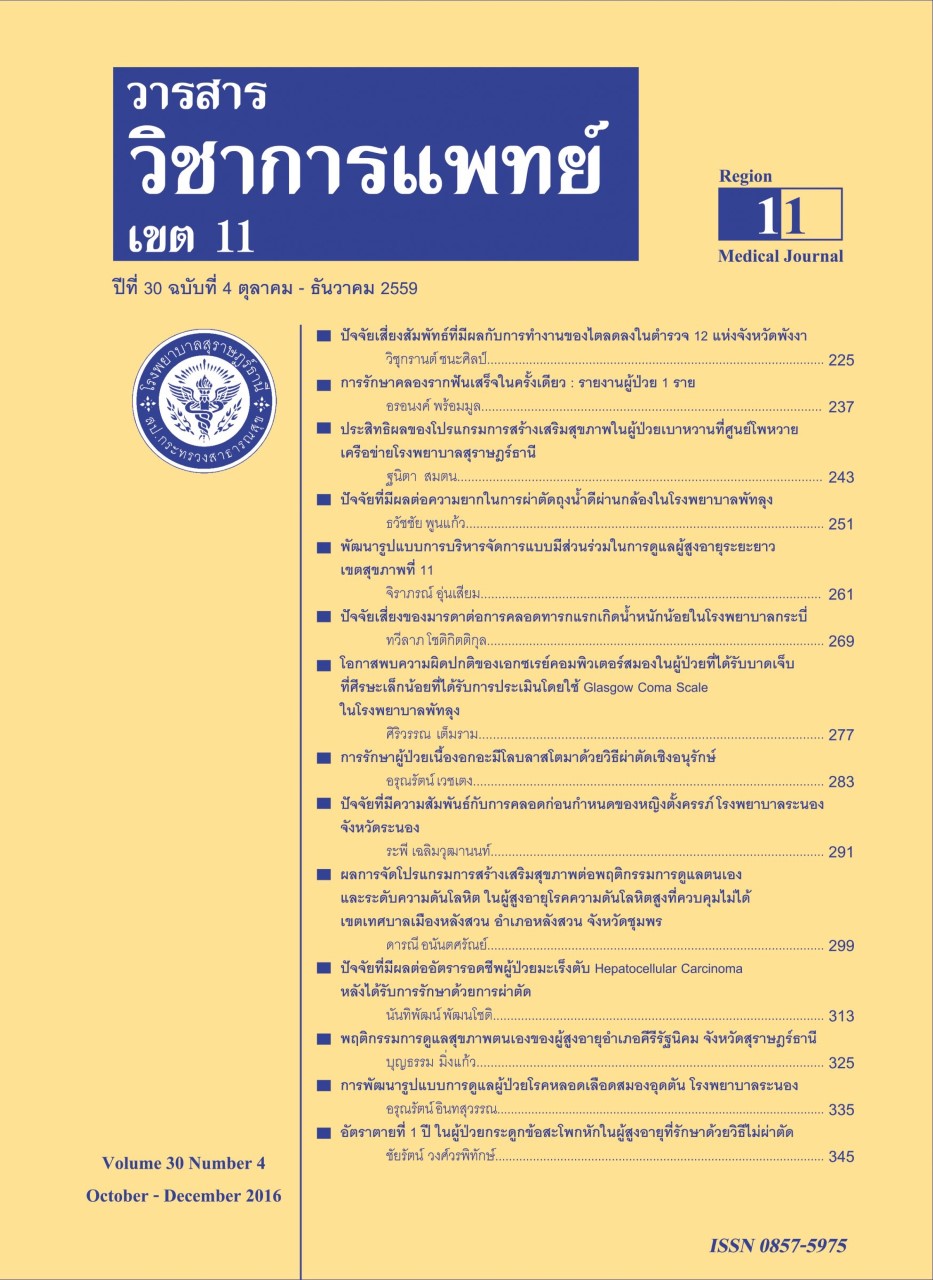Factors Effecting to Survival of Patients with Hepatocellular Carcinoma after Surgery Treatment
Keywords:
Hepatocellular carcinoma, survival, surgical treatmentAbstract
Objective : To investigate the factors affected to survival of patients with hepatocellular carcinoma (HCC) after receives surgical treatment.
Methods : A retrospective cohort study, data were collected from newly diagnosis of HCC and receives surgery at Roi Et Hospital during January 1, 2012 to December 31, 2015. All cases were follow-up the vital status until death or the end of study (March 31, 2016). All the variables of interest were retrieving from medical records and from cancer unit of Roi Et Hospital. The statistical analyses were used descriptive statistics, Kaplan Meier survival curves, Log-rank test and Cox proportional hazard model.
Result : Of 57 newly HCC diagnosis most of them were male 85.96%, mean age 63.77 years (+ SD=16.99). The total followup times were 1,103 person-months. The mortality rate was 3.44 per 100 person-months, median survival time of HCC after surgery was 15.8 months. The cumulative 3-, 6 months, 1-, 3 years survival rate were 89.47 %, 71.93 %, 64.64 % and 36.16 % respectively. After adjusted were found the factors affected to survival of HCC patient included metastasis of cancer (HR Adj. 1.72:95%CI;1.10- 3.59), chemotherapy (HR Adj. 3.34:95%CI; 1.38- 8.07), supportive treatment (HR Adj. 2.30:95%CI; 1.16-4.59) and cancer stage III (HR Adj. 5.67:95%CI; 1.18-27.31).
Conclusion : Ours study found the factors effected to survival of HCC patients after receives surgical treatment were metastasis of cancer, chemotherapy, supportive treatment and cancer stage III
References
J Int Cancer. 2010 Dec 15;127(12):2893–917.
2. Torre LA, Bray F, Siegel RL, Ferlay J, Lortet-Tieulent J, Jemal A. Global cancer statistics, 2012.CA Cancer J Clin. 2015 Feb 4;
3. Wiangnon S, Kamsa-ard S, Suwanrungruang K,Promthet S, Kamsa-ard S, Mahaweerawat S, et al. Trends in incidence of hepatocellular carcinoma,1990-2009, Khon Kaen, Thailand. Asian Pac J Cancer Prev APJCP. 2012;13(3):1065–8.
4. Wang Q, Xu Y, Zhou W, Zhong L, Wen Z, Yu H, etal. The viral oncoprotein HBx of Hepatitis B virus promotes the growth of hepatocellular carcinoma through cooperating with the cellular oncoprotein RMP. Int J Biol Sci. 2014;10(10):1181–92.
5. Tian S, Hui X, Fan Z, Li Q, Zhang J, Yang X, et al. Suppression of hepatocellular carcinoma proliferation and hepatitis B surface antigen secretion with interferon-λ1 or PEG-interferon-λ1. FASEB J Off Publ Fed Am Soc Exp Biol. 2014 Aug;28(8):3528–39.
6. Damania P, Sen B, Dar SB, Kumar S, Kumari A, Gupta E, et al. Hepatitis B virus induces cell proliferation via HBx-induced microRNA-21 in hepatocellular
carcinoma by targeting programmed cell death protein4 (PDCD4) and phosphatase and tensin homologue (PTEN). PloS One. 2014;9(3):e91745.
7. Kokudo T, Hasegawa K, Matsuyama Y, Takayama T, Izumi N, Kadoya M, et al. Survival benefit of liver resection for hepatocellular carcinoma associated
with portal vein invasion. J Hepatol. 2016 Nov;65(5):938–43.
8. Bauschke A, Altendorf-Hofmann A, Malessa C, Schüle S, Zanow J, Settmacher U. Which factors affect the long-term survival of patients with hepatocellular
carcinoma UICC stage IV? J Cancer Res Clin Oncol. 2016 Dec;142(12):2593–601.
9. Wanich N, Vilaichone R-K, Chotivitayatarakorn P, Siramolpiwat S. High Prevalence of Hepatocellular Carcinoma in Patients with Chronic Hepatitis B Infection in Thailand. Asian Pac J Cancer Prev APJCP. 2016;17(6):2857–60.
10. Schmoor C, Sauerbrei W, Schumacher M. Sample size considerations for the evaluation of prognostic factors in survival analysis. Stat Med. 2000 Feb
29;19(4):441–52.
11. Mao Z, Guo X, Su D, Wang L, Zhang T, Bai L. Prognostic Factors of Cholangiocarcinoma After Surgical Resection: A Retrospective Study of 293 Patients. Med Sci Monit Int Med J Exp Clin Res. 2015;21:2375–81.
12. Leerapun A, Thaikruea L, Pisespongsa P, Chitapanarux T, Praisontarangkul O-A, Thongsawat S. Clinical features and prognostic factors for liver cancer from a referral center in northern Thailand. J Med Assoc Thail Chotmaihet Thangphaet. 2013 May;96(5):531–7.
13. Somboon K, Siramolpiwat S, Vilaichone R-K. Epidemiology and survival of hepatocellular carcinoma in the central region of Thailand. Asian Pac J Cancer Prev APJCP. 2014;15(8):3567–70.
14. Khuhaprema T. Resection of hepatocellular carcinoma: personal experience with 67 patients and long-term results. J Med Assoc Thail Chotmaihet Thangphaet. 1999 Nov;82(11):1071–8.
15. Sotiropoulos GC, Machairas N, Stamopoulos P, Kostakis ID, Dimitroulis D, Mantas D, et al. Laparoscopic versus open liver resection for hepatocellular carcinoma: initial experience in Greece. Ann Gastroenterol Q Publ Hell Soc Gastroenterol. 2016 Dec;29(4):521–9.
16. Tong MJ, Siripongsakun S, Stanford-Moore G, Hsu L, Chang PW, Blatt LM. Tumor factors associated with clinical outcomes in patients with hepatitis B virus infection and hepatocellular carcinoma. Gastroenterol Hepatol. 2012 Dec;8(12):808–19.






